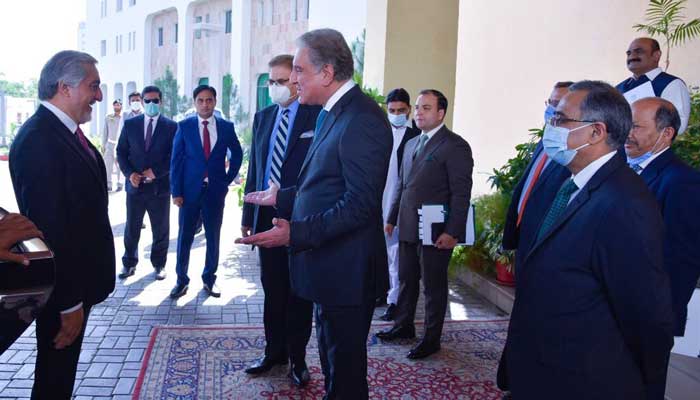Afghan leaders must make 'serious efforts' to take peace process forward: FM Qureshi
PM Imran Khan had invited Abduallah Abdullah last month “to visit Pakistan at earliest"
ISLAMABAD: Foreign Minister Shah Mahmood Qureshi called on the Afghan leadership to make “serious efforts” to ensure that the Afghan Peace Process is taken to its logical conclusion.
The foreign minister made the remark as he welcomed High Council for National Reconciliation (HCNR) of Afghanistan Chairman Dr Abdullah Abdullah at the Ministry of Foreign Affairs.
Abdullah is in Islamabad for a three-day trip, where he is expected to meet Prime Minister Imran Khan, President Arif Alvi and the Pakistani leadership.
“We respect Afghanistan's territorial integrity and sovereignty,” Qureshi said, adding that PM Imran Khan had constantly emphasised that Afghanistan’s problems cannot be solved through force alone.
The foreign minister said that the world has today acknowledged Pakistan’s stance on the problems faced by Afghanistan.
“Pakistan supports a peaceful and lasting political solution for Afghanistan through acceptable dialogue,” said Qureshi.
He also told the visiting dignitary that Pakistan will continue “playing a conciliatory role sincerely” in the Afghan peace process.
He added that Pakistan believes that peace in Afghanistan is essential for the development of the region, and warned that Afghan leaders will have to focus on the “miscreants” who try to derail the Afghan peace process. He also urged the world to come forward for the peace and development of Afghanistan.
Qureshi, while bringing up the Afghan refugees present in Pakistan, said Pakistan wants the “dignified repatriation” of Afghans living in Pakistan.
During the meeting, Dr Abdullah appreciated Pakistan for its conciliatory efforts and thanked PM Imran Khan and Foreign Minister Qureshi for their role in the Afghan process.
Upon his arrival, Dr Abdullah also planted a tree at the Foreign Office.
Earlier today, Prime Minister’s Adviser on Commerce Razak Dawood and Pakistan's Special Representative for Afghanistan Mohammad Sadiq received the Afghan leader at the Nur Khan Airbase.
'New chapter' of relations
In a statement before his departure to Islamabad, Abdullah Abdullah hoped his visit will open a new chapter of mutual cooperation at all levels, especially on achieving a lasting and dignified peace in Afghanistan.
“The visit will provide a unique opportunity for the two sides to exchange views on Afghanistan peace talks in Doha, & bilateral relations,” he posted on Twitter.
'Ties with Afghanistan fraternal'
The HCNR chief will also interact with the Chairman Senate Sadiq Sanjrani, Speaker of the National Assembly Asad Qaisar, Foreign Minister Makhdoom Shah Mahmood Qureshi and other dignitaries, the FO statement said.
"Dr Abdullah would also deliver a key-note address at the Institute of Strategic Studies Islamabad," the statement added.
His engagements will include interaction with the media.
“The visit will provide an opportunity for [a] wide-ranging exchange of views on the Afghan peace process and strengthening of Pakistan-Afghanistan bilateral relations and people-to-people interaction,” the FO press release said.
The handout said that Pakistan attaches high importance to its "fraternal ties with Afghanistan, rooted deep in shared history, faith, culture, values and traditions".
"Pakistan fully supports all efforts for peace, stability and prosperity of the Afghan people," it added.
The visit will further strengthen "amity, brotherhood and close cooperation between the two countries", it underscored.
PM warns against ‘hasty withdrawal’
PM Imran, in an opinion in Washington Post on Saturday, has warned the international community against a “hasty withdrawal” from the war-torn country and said abandoning the Afghan peace process for any reason would be "a great travesty".
"With the exception of the resilient Afghans themselves, no people have paid a higher price for the conflict in Afghanistan than the people of Pakistan. Through decades of conflict, Pakistan has dealt with the responsibility of taking care of more than 4 million Afghan refugees," wrote PM Imran.
The prime minister also talked about how the war in Afghanistan disrupted Pakistan's economic trajectory and radicalised fringes of the country's society. "The Pakistan I had known growing up in the 1960s and 1970s changed in some deeply unsettling ways," he noted.
-
Security forces gun down 30 terrorists in multiple IBOs in KP: ISPR
-
MQM-P calls for new province in Sindh
-
US report validates Pakistan military edge over India: PM
-
Banned TTP poses serious threat to Pakistan security: UNSC panel
-
CM Afridi clarifies remarks on by-poll after ECP requests army deployment
-
Dubai sees 3.2m Pakistani passengers in 2025 as airport sets new milestone
-
Security forces kill 23 Indian proxy terrorists in KP's Kurram
-
Pakistan to construct island to boost oil exploration: report












